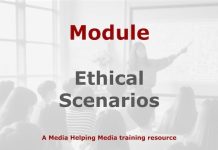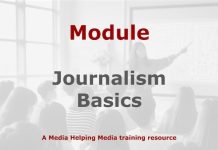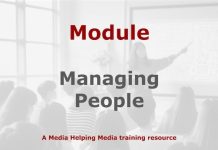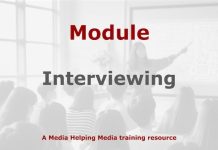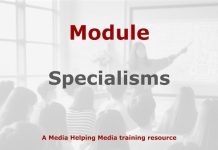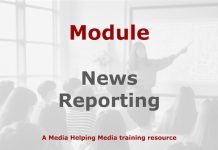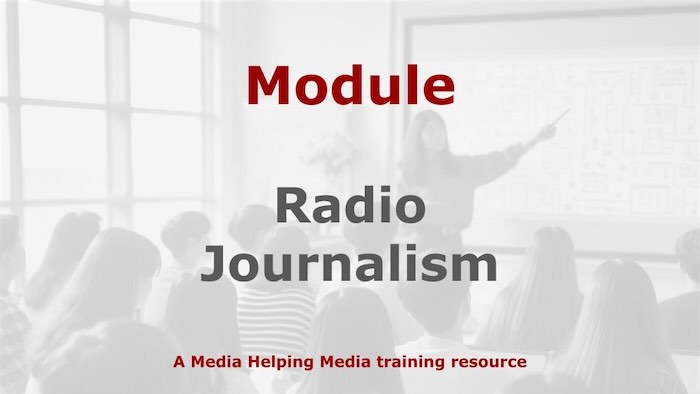 This six-week training module provides an outline for teaching students radio journalism skills from writing news scripts and producing radio programmes to planning and setting up community radio.
This six-week training module provides an outline for teaching students radio journalism skills from writing news scripts and producing radio programmes to planning and setting up community radio.
It’s designed to be adapted by college and university lecturers to address local teaching requirements.
Week 1: Writing and producing radio news
- What to expect:
- Students will learn the essential principles of writing for the ear, focusing on clarity, brevity, and accuracy. The session introduces how to distil complex information into concise scripts suitable for radio, using active language and logical story order. Students will also explore how to structure a radio news bulletin, select and prioritise stories, and use signposting for listeners. Practical exercises will include writing sample scripts and assembling short bulletins, simulating newsroom conditions.
- Focus: News values, script structure, story selection, writing for audio, bulletin assembly.
- Resources:
Week 2: Constructing news packages
- What to expect:
- This week focuses on building a complete radio news package, combining interviews, actuality, and narration to tell a compelling story. Students will learn how to plan a package, conduct and record interviews, and integrate audio elements for maximum impact. The session covers storyboarding, scripting, and the importance of narrative flow. Students will practise assembling packages, receive feedback, and reflect on how to maintain listener engagement throughout.
- Focus: Package planning, interviewing, audio gathering, narrative structure, scripting for packages.
- Resources:
Week 3: Audio editing and bulletin refinement
- What to expect:
- Students will be introduced to digital audio editing software and techniques for editing interviews, actuality, and voiceovers. The session covers basic and advanced editing skills, such as cutting, fading, mixing, and balancing sound levels. Students will also learn how to refine bulletins for timing, clarity, and impact, ensuring professional broadcast standards. Practical exercises will include editing raw audio and assembling a polished news bulletin.
- Focus: Audio editing, sound quality control, bulletin timing, technical standards for broadcast.
- Resources:
Week 4: Documentaries and current affairs
- What to expect:
- This week explores the creation of longer-form radio content, including documentaries and current affairs programmes. Students will learn how to research topics in depth, develop a documentary proposal, and structure a narrative over a longer duration. The session covers advanced interviewing, ethical considerations, and the use of music and effects to create atmosphere. Students will plan and script a short documentary or current affairs feature, with an emphasis on storytelling and investigative techniques.
- Focus: In-depth research, documentary planning, narrative development, ethical reporting, creative audio use.
- Resources:
Week 5: Distinctive sound and interview skills
- What to expect:
- Students will examine how to create a distinctive station sound through the use of branding, music, and production values. The session also delves into interview techniques, focusing on understanding interviewee motivations, building rapport, and eliciting strong responses. Practical activities will include developing station idents and practising interviews in various scenarios, with feedback on style and effectiveness.
- Focus: Station branding, audio identity, advanced interviewing, understanding audience and interviewee dynamics.
- Resources:
Week 6: Community radio – planning and operations
- What to expect:
- The final week introduces the principles and practicalities of community radio. Students will learn how to plan, set up, and manage a community station, including project planning, creating a running order, and engaging with local audiences. The session covers regulatory requirements, funding models, and the importance of community involvement. Students will develop a basic project plan and running order for a sample community radio station, considering both editorial and operational needs.
- Focus: Community radio planning, station management, project development, running order creation, regulatory awareness.
- Resources:
This radio journalism module ensures that students gain a comprehensive, practical, and industry-relevant grounding in all core areas of radio journalism, from news writing and production to community broadcasting and documentary-making. Each session combines theory, practical exercises, and critical reflection, preparing students for real newsroom environments and broadcast standards.
